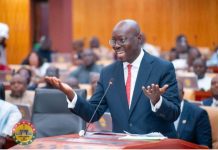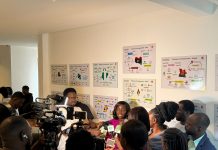Certainly there is no doubt that the invasion of Ukraine by Russia has economic consequences for the rest of the World especially African Countries which are largely import-driven economies.
But it is also equally important for African Leaders to be proactive, and pragmatic and find the appropriate economic turnaround solutions for their respective Countries rather than always largely putting the blame on Russia-Ukraine War and to some extent COVID-19 pandemic.
A lot of Countries relatively are doing well in the midst of the COVID-19 pandemic and the Russia-Ukraine War.
Since January 2021, the United States of America has invested more than $9.8 billion in Security assistance to Ukraine aimed at protecting the Country’s territorial integrity and Sovereignty against the aggression of Russia.
In February 2022, the United Kingdom gave about £220million in humanitarian aid to Ukraine to help save lives.
In June 2022, the Prime Minister of the UK announced a further aid of £1 billion in military support to Ukraine to enable Ukraine to sustain its resistance to the Russian invasion.
The £1 billion package was announced during the NATO Leaders’ Summit on Thursday, June 30th, 2022.
So far, in total, the UK has committed £2.3 billion in military assistance to Ukraine.
The European Union has agreed to provide lethal Arms through its European Peace Facility(EPF). “This is the first time in history that the European Union has approved the supply of lethal weapons to a third Country”.
As at today, 6th September 2022, the European Union has committed €2.5 billion to Ukraine.
At the Heads of State and Government Summit in Madrid on 30th June, 2022, NATO allies agreed to a new package of assistance for Ukraine aimed at providing a long-term and sustainable support against the aggression of Russia.
In March, 2022, the Executive Board of the International Monetary Fund(IMF) approved a disbursement of $1.4 billion under the Rapid Financing Instrument(RFI) to help meet the urgent financing needs of Ukraine as well as mitigate the economic impact as a result of the Country’s war with Russia.
It is important to state that, before the Russia-Ukraine War, the IMF was already having a financial Programme with Ukraine of which Ukraine received $700 million from the IMF.
On August 8, 2022, the World Bank Group announced a $4.5 billion additional financing mobilized for Ukraine under the Public Expenditures for Administrative Capacity Endurance in Ukraine(PEACE) Project. This facility is aimed at supporting Ukraine to meet the needs created by the ongoing war with Russia.
To date, the World Bank Group has mobilized nearly $13 billion in emergency financing to help blunt the widespread human and economic impacts of the Russia-Ukraine War. More than $6.3 billion of this financing has been disbursed as at the end of 31st July 2022.
However, it is very surprising that despite the war between Russia and Ukraine, these two Countries are relatively doing better than most African Countries.
The Inflation rate of Ukraine in July 2022 was 22.2%, far better than some African Countries.
Ukraine’s inflation rate accelerated partly due to the decision by the Country’s Central Bank to DEVALUE the local Currency(hryvnia) against the US Dollar to shore up the Country’s war-battered economy.
The 22.2% Consumer inflation of Ukraine in July 2022 were also due to supply disruptions of vegetables and fruits from the Russian-occupied South and the reinstatement of duties on imported goods.
In July 2022, the inflation rate of Russia was 15.1% far better than some African Countries.
Russia’s ruble, the local currency of Russia despite Sanctions has actually gotten so strong against the US Dollars and Euro. The Russian local currency, ruble is currently one of the World’s top-performing currency.
What are we not doing right as African Countries to position our economies to be free from external factors or exogenous shocks?
What measures can we put in place to safeguard the African economies from significant global influence and exogenous shocks?
Can African Countries survive without the help of IMF and World Bank support?
The Russia-Ukraine War may not end anytime soon, so what prudent measures are African Leaders putting in place to ensure that instead of blaming Russia-Ukraine War, we are able to successfully run our respective Countries with strong resistance to exogenous shocks?
What measures are we putting in place to ensure that we do not return to IMF again regardless exogenous shocks?
On July 2022, Turkey, the United Nation(UN), Russia and Ukraine signed an agreement in Istanbul to resume GRAIN EXPORTS from three Ukrainian Black Seaports, which were paused after the Russia-Ukraine War began in February 2022. A joint Coordination Center with Officials from Ukraine, Russia and Turkey and the United Nation has been set up in Istanbul to oversee the shipments.
Since this arrangement, more than 90 Ships have carried over 2 million tons of Agricultural products from Ukraine attracting million of dollars to the economy of Ukraine.
Russia has earned an estimated amount of $84.5 billion(€85 billion) in revenue from its Fossil Fuel Exports(gas, oil and coal) to the EU since the War in Ukraine began in February 2022.
Since February, the European Union has provided Russia with 54% of its €158 billion(approximately $157.3 billion) in fossil fuel revenue, more than double the amount provided by China and around 8 times more than amount provided by Turkey.
Recently, China has overtaken Germany to become the leading largest PURCHASER of Russian fossil fuels.
Even though Ukraine’s grain exports were down by 46% due to the invasion by Russia, Ukraine earned $22.2 billion from exporting grain and oilseeds for the 2021/2022 marketing year according to the State-run Ukrinform News Agency.
African Leadership must Wake Up to the economic reality affecting their Citizens on the Continent and stop the blame games.
How long will African Leaders continue to blame Russia and Ukraine as the Cause and Effect of our economic woes?
Citizens want home-driven solutions and not exogenous blame games.









































